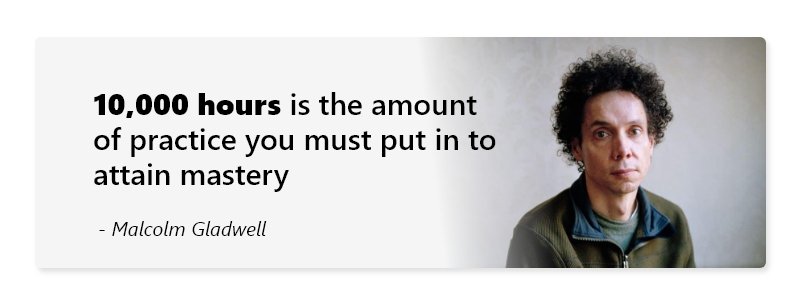In absolute terms, the student population increased from 3.66 crores to 3.74 crores. This number is increasing every year, which means that the number of college applicants competing with you is increasing exponentially. Let’s talk about 5 Elements That Will Make Your College Application Stand Out.
How can you make your college application stand out in such a competitive scenario? If your answer is, ‘By working hard and getting good grades,’ here’s something you should definitely consider.
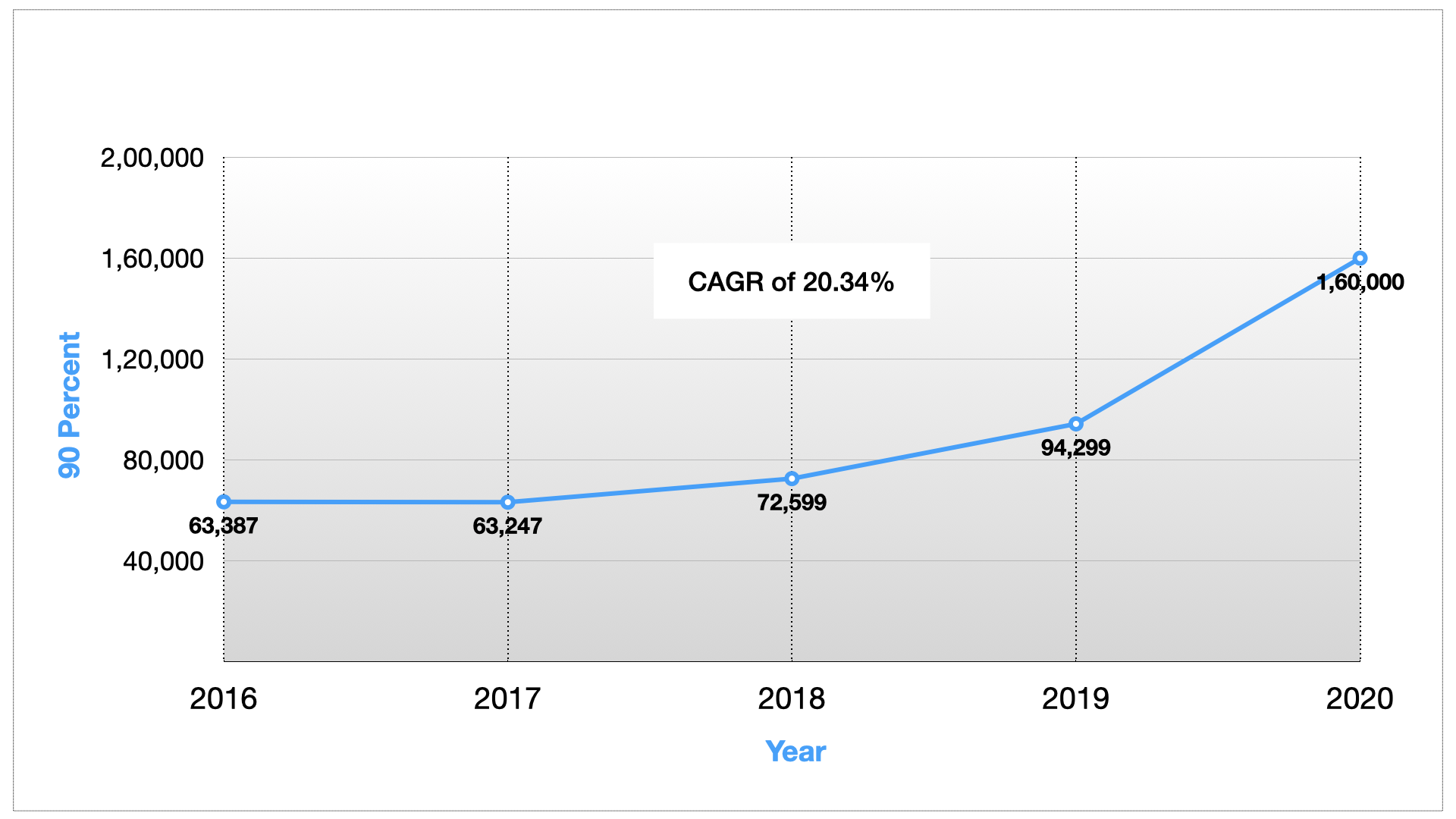
A trendline showing the increase in the number of students scoring 90% A trendline showing the increase in the number of students scoring 95%
A trendline showing the increase in the number of students scoring 95%
In the last four years, there has been a 314% increase in the number of students scoring 95% in Class 12 Board exams and a 153% increase in the number of students scoring 90%. Read our blog on the inflation of marks to understand the competition even better.
Do you still think mentioning your marks will help your college application stand out? If you are wondering what the solution might be, keep reading.
According to the National Association for College Admission Counseling (NACAC), an organization of more than 15,000 professionals from around the world, apart from grades, test scores, etc., colleges look for certain things in a college application. They include:
- Extracurricular commitment
- Demonstrated interest
- Letters of recommendation
- Passion for the chosen subject
- Communication
All of the above attributes can be showcased in a college profile.
What is a College Profile?
A college profile is a document that tells a college who you are, what’s your personality like, where your interests lie, and most importantly, gives proof of everything you have accomplished so far.
A College Profile broadly has two sections – Academic Profile and Non-Academic Profile
Academic Profile: An academic profile is quite straightforward. It includes your academic records, board exam results, and entrance test scores.
Non-Academic Profile: A non-academic profile, as the name suggests, showcases everything you have done beyond the classroom. Some of these activities include:
- Participation in extracurricular activities
- Summer programs
- Internships
- Innovations
- Accolades received
- Volunteering
- Leadership roles, etc.
5 Elements Of A Non-Academic Profile That Make Your College Application Stand Out
We already spoke about the importance of a non-academic profile for securing admission to a top college. But, a non-academic profile is a wide umbrella and many students might get lost in the details.
This will result in missing out on the focus elements of a non-academic profile. Let’s delve deeper into the 5 aspects of a non-academic profile you should ideally focus on to ensure that your college application stands out from the competition.
1. Demonstrated Interest in a Chosen Subject
Demonstrated Interest is a parameter that colleges use to measure a student’s interest in a particular subject and a specific college.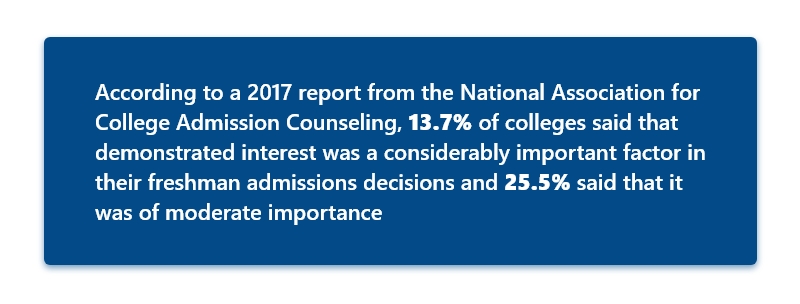
Every college and subject choice has different parameters to measure demonstrated interest. If you want to demonstrate interest, the first thing you need to do is finalise your career goals. You should be certain about the subject you want to study and the college and country in which you want to pursue it. If this is not attended to, all your efforts might go in vain as you might focus on things that don’t matter in a certain subject and college.
Here are a few ways in which you can demonstrate interest in a particular subject:
- Attend workshops
- Participate in summer workshops
- Take up a summer internship
- Start a club, etc.
Here are a few ways in which you can demonstrate interest in a particular college:
- Apply early
- Visit the campus
- Attend summer programs and webinars conducted by the college
- Connect with colleges on social media and open every email sent by the college
- Write emails to admission officers, etc.
A list of colleges that take Demonstrated Interest seriously:
- Boston University
- Westmont College
- Michigan State University
- Rice University
- Ashoka University
- National Institute of Design (NID)
2. Consistency & Commitment
Top colleges in India and abroad receive thousands of applications every year. Delhi University (DU) witnessed an 18% increase in the number of applications compared to last year.
“We have already received nearly 3.3 lakh applications,” said DU Dean for Admissions, Shobha Bagai.
Colleges in the US also receive a large number of applications every year. University of California—Los Angeles receives more than 1,10,000 applications every year and New York University receives 71,000 applications every year, etc. The competition is high and admission officers are well-versed with how to pick the right application.
Hypothetically, let’s say you did not work on your non-academic profile until the middle of class 12. Then in six months, you cram more than 20 activities in your schedule, just to showcase it on your profile. Admission officers will understand that it was just done for the admissions process.
They look for non-academic profiles with consistency & commitment. As mentioned earlier, admission officers go back to as early as class 8 to check for consistency & commitment in a student. They analyse if you keep changing your extracurriculars or decide on what you want and keep excelling at it.
How long have you committed to the activity of your choice?
How constantly have you pursued it?
Did you commit to the subject of your choice in class 11 & class 12?
These are some of the aspects an admission officer looks at to judge if you are consistent and if you showcase commitment. Decide early and start showing these attributes in your profile.
3. Leadership
Leadership is one of the most important qualities that admission officers look for in a college application. There are two reasons why:
- Colleges believe that students with leadership qualities take the name of the college a notch higher.
- Colleges want to build the leaders of tomorrow. They do so by accepting students who showcase leadership qualities and help them work on it.
If you want to stand out from your competition, you must be able to prove that you possess leadership qualities in your non-academic profile. Here are a few ways you can do it:
- Run a position for office in high school
- Start your own club or social service group
- Volunteer in an old age home
- Mentor your peers or juniors, etc.
Harvard University, MIT, Yale University, University of Oxford, Ashoka University, KREA University, and a plethora of other colleges value leadership skills in a student.
Not only does leadership distinguish a student in a competitive applicant pool from other students, but also serves to foreshadow the impact the student could make on the college/university campus and the potential impact they could make once they graduate. – Emmi Harward, Executive Director of the Association College Counselors in Independent Schools
4. Awards & Accolades
Top colleges have very low acceptance rates. Here’s a sneak peek into the acceptance rates in a few top colleges.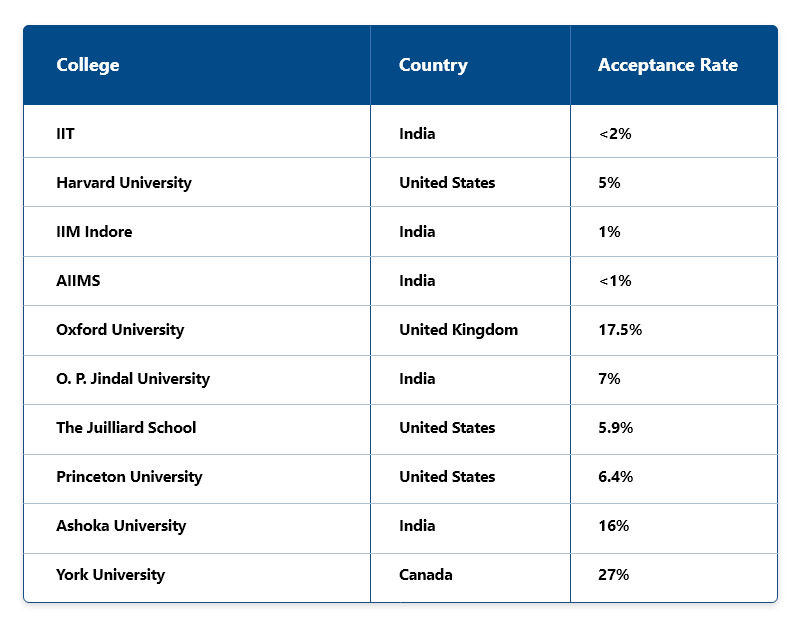
Imagine if thousands of students are applying to a college along with you and they have the same extracurricular activity as you on their non-academic profile, admission officers are more likely to choose someone who has shown exceptional performance in it.
This is judged by awards, diplomas, certificates, and other aspects that substantiate your expertise in the activity.
5. Alignment Of Your Non-Academic Profile To Your Dream University
Imagine you put in hours and hours of your blood, sweat, and tears on an extracurricular activity only to realize that the college you want to apply to does not consider the activity important.
That’s such a waste of your time, energy and money. Your extracurricular activities need to be aligned with the course you want to study and the college you want to study in. Once this alignment happens, your extracurricular activities become supercurricular activities.
Read our blog on supercurricular activities to dive deeper into them.
For your non-academic profile to be aligned with the college you want to study in, you need to decide on your career goals early on and focus on the right things. Here is a list of different universities and what they look for in a college application.
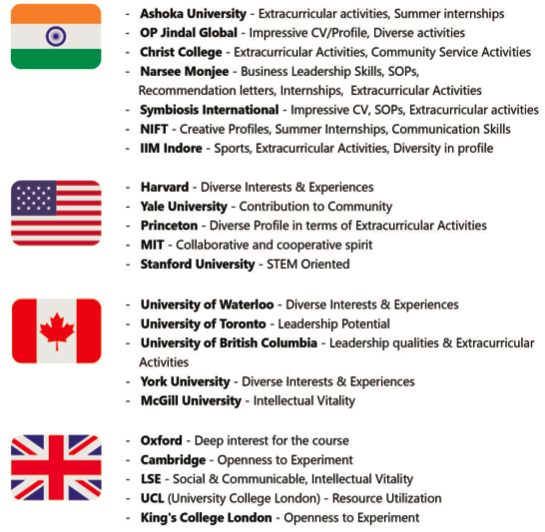
To make sure that you have all the 5 elements in the non-academic profile of your college application, you need to:
- Get clarity on what your goal is early on and decide which career you want to pursue.
- Understand the requirements of the college you want to apply to and prepare accordingly. Most students ignore this and work on qualities that are not aligned with their dream college.
- Make a plan of action and invest in activities that will take you closer to your dream college.
- Strike a balance between academics and non-academics to achieve the best possible result. A roadmap should be made to help you achieve that balance.
Conclusion – Build A Strong Non-Academic Profile
Now you have all the information about the secret elements that will help you build a strong non-academic profile. Don’t leave your college admission to chance. Get professional guidance and supercharge your admission chances. Which of the five elements will you work on first? Comment and tell us!
Sneha Mashetty is a former journalist who covered state politics. With a degree in Journalism & Masters in Electronic Media, she combines her research techniques, versatility in writing for the web, and love for education at Univariety. She has written extensively for International schools, Ed-Tech products, emerging learning technologies for half a decade. An avid reader, a travel lover & a movie buff who loves to have meaningful conversations





